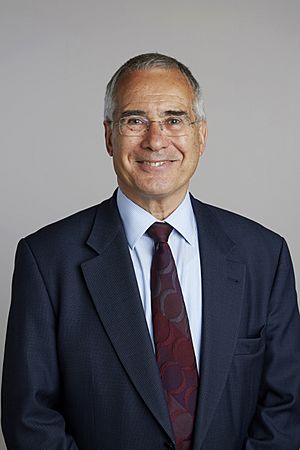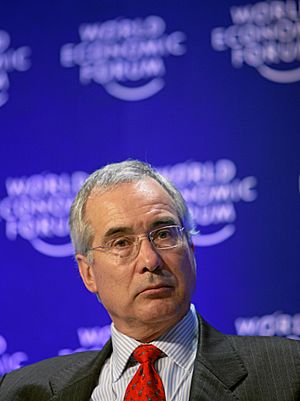Nicholas Stern, Baron Stern of Brentford facts for kids
Quick facts for kids
The Lord Stern of Brentford
|
|
|---|---|

Stern in 2015
|
|
| President of the British Academy | |
| In office 2013–2017 |
|
| Preceded by | Adam Roberts |
| Succeeded by | David Cannadine |
| Chief Economist of the World Bank | |
| In office July 2000 – 2003 |
|
| President | James Wolfensohn |
| Preceded by | Joseph Stiglitz |
| Succeeded by | François Bourguignon |
| Member of the House of Lords Lord Temporal |
|
| Assumed office 10 December 2007 Life peerage |
|
| Personal details | |
| Born |
Nicholas Herbert Stern
22 April 1946 Hammersmith, London, England |
| Political party | Crossbench |
| Education | Peterhouse, Cambridge (BA) Nuffield College, Oxford (MA, DPhil) |
| Known for | Stern Review (2006) |
| Awards | Fellow of the British Academy (1993) Blue Planet Prize (2009) Fellow of the Royal Society (2014) Member of the Order of the Companions of Honour (2017) |
| Scientific career | |
| Institutions | University of Oxford University of Warwick London School of Economics Collège de France British Academy |
| Thesis | Location and the Rate of Development: A Study in the Theory of Optimum Planning (1971) |
| Doctoral advisor | James Mirrlees |
Nicholas Herbert Stern, Baron Stern of Brentford (born 22 April 1946), is a British economist, banker, and academic. He is known for his important work on the economics of climate change.
He is a professor at the London School of Economics (LSE). He also leads the Grantham Research Institute on Climate Change and the Environment. From 2013 to 2017, he was the President of the British Academy. In 2014, he became a Fellow of the Royal Society.
Contents
Education and Early Career
Nicholas Stern went to Latymer Upper School. He then studied maths at Peterhouse, Cambridge, earning a degree in 1967. In 1971, he received his PhD in economics from Nuffield College, Oxford. His research focused on how economies grow and how to plan for development. His supervisor, James Mirrlees, later won the Nobel Prize in Economics.
Teaching and Research Roles
Stern taught at the University of Oxford from 1970 to 1977. He then became a professor of economics at the University of Warwick from 1978 to 1987. From 1986 to 1993, he taught at the London School of Economics.
His early research looked at how countries develop their economies. He also wrote books about Kenya and the Green Revolution in India.
Work at the World Bank and UK Government
From 1994 to 1999, Nicholas Stern was the Chief Economist for the European Bank for Reconstruction and Development. This bank helps countries in Europe develop their economies.
Chief Economist at the World Bank
From 2000 to 2003, he served as the Chief Economist and Senior Vice-President of the World Bank. The World Bank is an international organization that helps countries reduce poverty and support development.
Role in the UK Government
After his time at the World Bank, Stern worked for the British government. In 2003, he joined HM Treasury, which is the UK's finance department. He was responsible for public finances and led the Government Economic Service.
He also helped lead the Commission for Africa. This group worked on ways to help African countries develop.
The Stern Review on Climate Change
In 2005, Nicholas Stern was asked to lead a major study on the economics of climate change. This study became known as the Stern Review Report on the Economics of Climate Change. It was published in October 2006.
Understanding Climate Change as an Economic Problem
The Stern Review explained that climate change is a huge "market failure." This means that people who cause pollution by releasing greenhouse gases usually don't pay for the harm they cause. Stern called it the "greatest market failure the world has seen."
Solutions for Climate Change
The review suggested several ways to reduce greenhouse gas emissions. These included new rules, carbon taxes, and carbon emission trading. Carbon trading allows companies to buy and sell permits to pollute.
The report concluded that reducing greenhouse gas emissions is possible and affordable. It stressed that acting quickly is important to avoid the worst dangers of climate change. The findings of the review were widely discussed around the world.
Reactions to the Review
Economists had different opinions about the Stern Review. Some supported its ideas, while others had criticisms. However, many agreed that climate change is a serious economic issue. Stern later said he might have even underestimated the risks of climate change in his original report.
Current Work and Advocacy
Since 2007, Nicholas Stern has continued his important work on climate change. He became the first holder of the I. G. Patel Chair at the London School of Economics. In 2008, he became the Chair of the Grantham Research Institute on Climate Change and the Environment at LSE.
Books and Global Initiatives
In 2009, he published a book called Blueprint for a Safer Planet. He also wrote The Global Deal: Climate Change and the Creation of a New Era of Progress and Prosperity. This book looks at climate change from an economic view. It suggests steps for global economic growth while dealing with climate change.
Stern is also a co-chair of the Global Commission for the Economy and Climate. This group works on how the economy and climate change are connected. He supports vegetarianism as a way to help reduce climate change.
Optimism for the Future
After the 2015 United Nations Climate Change Conference in Paris, Stern felt very positive. He said that if we handle climate change correctly, it could be more powerful than the Industrial Revolution. He believes we are at the start of a huge technical revolution. He also stated that the economic crisis could be a chance to build a better future.
In 2021, Stern published a paper arguing that economists had not valued young lives enough when thinking about the climate crisis. This shows his continued focus on the long-term impacts of climate change.
Awards and Honours
Nicholas Stern has received many awards for his work.
- In 1993, he became a Fellow of the British Academy.
- In 2004, he was made a Knight Bachelor for his services to economics.
- In 2007, he was made a life peer, becoming Baron Stern of Brentford. This means he sits in the House of Lords as a non-party political member.
- In 2009, he received the Blue Planet Prize for his contributions to solving global environmental problems.
- In 2010, he won the BBVA Foundation Frontiers of Knowledge Award for his report on climate change economics.
- In 2014, he was elected a Fellow of the Royal Society for his work on climate change economics.
- In 2017, he was appointed a Member of the Order of the Companions of Honour. This is a special award for outstanding achievements.
- In 2021, he was awarded the Bernhard Harms Prize by the Kiel Institute for the World Economy.
Personal Life
Nicholas Stern is the son of Bert and Marion Stern. His uncle was Donald Swann, who was part of the famous comedy duo Flanders and Swann. His brothers are Richard Stern and Brian E Stern, and his sister is Naomi Opalinska.
Works
- A Strategy for Development, World Bank Publications, 2002.
- The Economics of Climate Change: The Stern Review, Cambridge University Press, 2007.
- A Blueprint for a Safer Planet: How to Manage Climate Change and Create a New Era of Progress and Prosperity, Bodley Head, PublicAffairs, 2009.
- The Global Deal: Climate Change and the Creation of a New Era of Progress and Prosperity, 2009.
- Why Are We Waiting? The Logic, Urgency, and Promise of Tackling Climate Change, MIT Press, 2015.
 | Emma Amos |
 | Edward Mitchell Bannister |
 | Larry D. Alexander |
 | Ernie Barnes |


